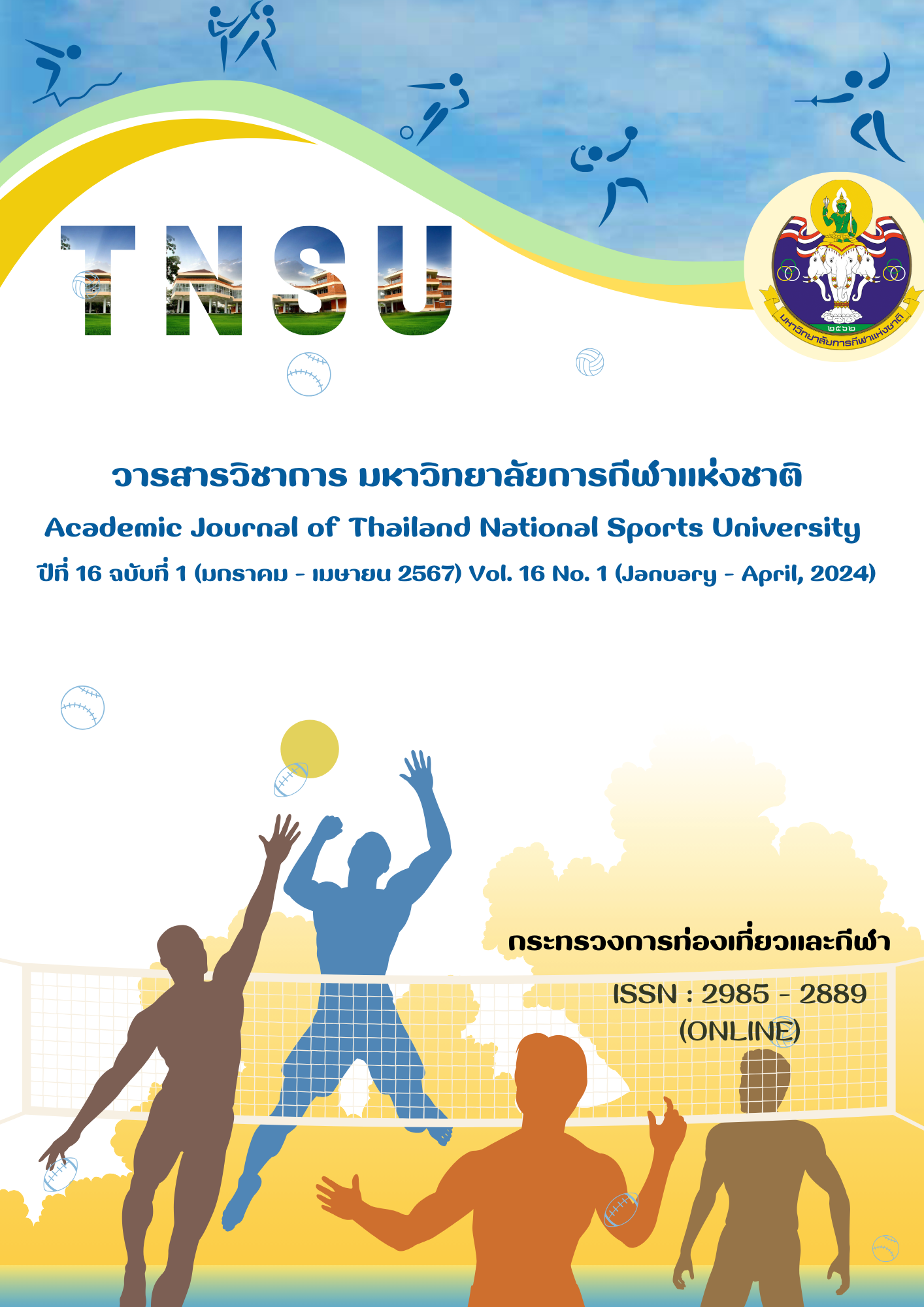ผลของโปรแกรมการศึกษาการใช้เวลาว่างหลังโรงเรียนเลิกที่มีต่อคุณภาพชีวิต ของนักเรียนชั้นมัธยมศึกษาปีที่ 3
Main Article Content
บทคัดย่อ
การวิจัยกึ่งทดลองนี้มีวัตถุประสงค์ เพื่อศึกษาผลของการเข้าร่วมโปรแกรมการศึกษาการใช้เวลาว่างหลังโรงเรียนเลิกที่มีต่อคุณภาพชีวิตของนักเรียนชั้นมัธยมศึกษาปีที่ 3 กลุ่มตัวอย่าง คือ นักเรียนมัธยมศึกษาปีที่ 3 ของโรงเรียนกีฬาองค์การบริหารส่วนจังหวัดพิษณุโลก จำนวน 60 คน ที่ได้มาจากการคัดกรองจากแบบสอบถามคุณภาพชีวิต และการสุ่มแบบจับคู่ (Match - Paired Sampling) ออกเป็นกลุ่มควบคุม จำนวน 30 คน และกลุ่มทดลอง จำนวน 30 คน เครื่องมือวิจัยประกอบด้วย: - 1) แบบประเมินคุณภาพชีวิต ผ่านการตรวจสอบความเที่ยงตรงเชิงเนื้อหาจากผู้ทรงคุณวุฒิการใช้เวลาว่าง จำนวน 4 ท่าน ได้ค่าดัชนีความสอดคล้อง (IOC) มีค่า อยู่ในช่วง 0.75 - 1.00 และค่าสัมประสิทธิ์สหสัมพันธ์ความเชื่อมั่น Cronbach มีค่า = .82 และ
2) โปรแกรมการศึกษาการใช้เวลาว่างหลังโรงเรียนเลิก 8 สัปดาห์ ผ่านการตรวจความเที่ยงตรงเชิงประจักษ์จากผู้ทรงคุณวุฒิการใช้เวลาว่าง จำนวน 4 ท่าน ได้ค่าโปรแกรมอยู่ในระดับเหมาะสมมาก วิเคราะห์ข้อมูลโดยใช้ค่าเฉลี่ย ส่วนเบี่ยงเบนมาตรฐาน และการทดสอบค่าที (t - test)
ผลการวิจัยพบว่า: - 1) ภายหลังการเข้าร่วมโปรแกรมฯ กลุ่มทดลองมีคุณภาพชีวิตดีขึ้นกว่าก่อนเข้าร่วมโปรแกรม ฯ อย่างมีนัยสำคัญทางสถิติที่ระดับ .05 และ 2) ภายหลังการเข้าร่วมโปรแกรม ฯ กลุ่มทดลองมีคุณภาพชีวิตดีกว่ากลุ่มควบคุมอย่างมีนัยสำคัญสถิติที่ระดับ .05 สรุปได้ว่าโปรแกรมการศึกษาการใช้เวลาว่างหลังโรงเรียนเลิกของนักเรียนชั้นมัธยมศึกษาปีที่ 3 มีผลต่อคุณภาพชีวิตของนักเรียนชั้นมัธยมศึกษาปีที่ 3 และมีความเหมาะสมที่จะนำไปประยุกต์ใช้
Article Details

อนุญาตภายใต้เงื่อนไข Creative Commons Attribution-NonCommercial-NoDerivatives 4.0 International License.
บทความที่ได้รับการตีพิมพ์เป็นลิขสิทธิ์ของวารสารวิชาการ มหาวิทยาลัยการกีฬาแห่งชาติ ข้อความที่ปรากฏในบทความแต่ละเรื่องในวารสารวิชาการเล่มนี้ เป็นความคิดเห็นส่วนตัวของผู้เขียนแต่ละท่านไม่เกี่ยวข้องกับวารสารวิชาการมหาวิทยาลัยการกีฬาแห่งชาติ แต่อย่างใด ความรับผิดชอบองค์ประกอบทั้งหมดของบทความแต่ละเรื่องเป็นของผู้เขียนแต่ละท่าน หากมีความผิดพลาดใดๆ ผู้เขียนแต่ละท่านจะรับผิดชอบบทความของตนเองแต่ผู้เดียว
เอกสารอ้างอิง
Anderson, L., & Heyne, L. A. (2012). Therapeutic recreation practice: A strengths approach. PA: Venture Publishing.
Best, J. W. (1970). Research in education (3rd ed.). NJ: Prentice Hall.
Chomwart Phetdaeng. (2020). Effects of leisure program on well - being of junior high school students. Academic Journal of Thailand National Sports University, 14(2), 189 - 200.
Dattilo, J. (2002). Inclusive leisure services: Responding to the rights of people with disabilities. PA: Venture Publishing.
Department of Health. (2017). Thai people are in sedentary activity 14 hours /day. Matichon Newspaper, 40(14510), December 8, p. 7.
Department of Mental Health. (2018). Remind parents don’t avoid the problem of their aggressive children. Bangkok: The Website
of Department of Mental Health, Ministry of Public Health. Retrieved from: https://dmh.go.th/newsdmh/view.asp?id=27971
Edginton, C. R., Dieser, R. B., Lankford, S. V., & Kowslski, C. L. (2019). Recreation and leisure programming: A 21st century perspective. IL: Sagamore - Venture.
Ertuzun, E. (2015). Effects of leisure education program including sportive activities on perceived freedom in leisure of adolescents with intellectual disabilities. Academic Journals, 10(6), 2362 – 2369.
Hirsch, B.J. (2011). Learning and development in afterschool programs. Phi Delta Kappan, 92(5), 66 – 69.
Hog, G., Dattilo, J. & Williams, R. (1999). Effects of leisure education on perceived freedom in leisure of adolescents with mental retardation. Therapeutic Recreation Journal, Fourth Quarter, 320 - 322.
Jenkins, J. M & Pigram, J. J. (2003). Encyclopedia of leisure and outdoor recreation. New York: Routledge.
Kanlapruk Polson. (2016). The development of leisure program for promoting well - being of visually impaired students (Doctoral Dissertation), Srinakharinwirot University.
Kittima Teumput. (2008). Effects of leisure program on social development of high school students at Pattaloung School in Pattaloung Province (Master’s Thesis), Kasetsart University.
Krejcie, R. V., & Morgan, D. W. (1970). Determining sample size for research activities. Educational and Psychological Measurement, 30, 607 – 610.
Leitner, M.J. & Leitner, S.F. (2012). Leisure enhancement. IL: Sagamore Publishing.
Lynne, H.A., Wallace, B. C., Rebecca, B. D., Zingarelli, D., & Siegele, E. (2015). After - school program for urban youth: Evaluation of a health careers course in New York City High Schools. Information Services & Use, 35, 141 – 160. doi: 10.3233/ISU-150773.
Marttinen, R., & Fredrick, R.N. (2017). An afterschool approach to physical education. Strategies, 30(Jan - Feb), 8 - 14.
Mundy, J. (1998). Leisure education: Theory and practice. IL: Sagamore Publishing.
Norcia, A.D, Mascaro, C., Bianchi, D. et al. (2022). Adolescent psychological well - being during the cociv-19 lockdown: the role of leisure activities and online peer communication. Retrived from https: //doi.org/10.1007/s12144-022-03679-7
Office of the Minister of Public Health. (2019). Catch Youth 19 years old to transfer drug agent in order to find money for travel. Retrieved from https://www.sanook.com/news/7712650/
Pornchan Lojanasupareuk. (2018). The development of a leisure education program for promoting quality of life of upper elementary school students (Doctoral Dissertation), Srinakharinwirot University.
PPTV36 Online. (2020). Catch adolescent 17 years old to be a drug merchant. Retrieved from www.pptvhd36.com/news/ประเด็นร้อน/129988,
Rossman, J. R., & Schlatler, B. E. (2015). Recreation programming: Designing and staging leisure experiences. IL: Sagamore.
Ruskin, H., & Sivan, A. (2002). Leisure education in school system. Jerusalem: Studio Hashlosha Printers.
Symonds, N., Beemer, B. C., & Robertson, T. (2019). Health, wellness and quality of life. In T. Tapps & M.S. Wells. (Eds.). Introduction to recreation and leisure. IL: Human Kinetics.
World Health Organization. (2019). Signal reminds “Children addict games”, guide to treat before late. Retrieved from https://news.thaipbs.or.th/content/285367
World Health Organization. (2023). Starting from education to political works. Matichon Newspaper, 46(16390).


